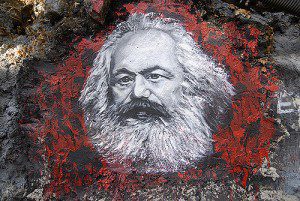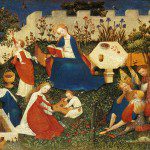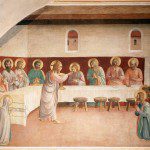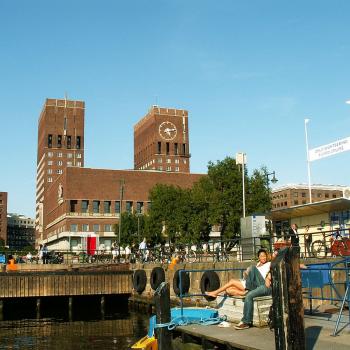
The title of this piece may raise eyebrows, as I know that many within Catholic, even more broadly orthodox Christian, circles see “Marx” and think “fiend.” Still, we ought to pause: why has Marx been so influential for so long? And especially why so influential among Catholic—not to mention many other sorts of Christian—thinkers? There are Peter Maurin, Dorothy Day, Fr. Herbert McCabe, Fr. Gustavo Gutiérrez, Alasdair MacIntyre, Terry Eagleton, Denys Turner, and even Pater Edmund Waldstein (who, if not himself deeply steeped in Marx, does not run from him). These are orthodox figures (Fr. Gutiérrez, for example, has co-authored a book with Cardinal Müller, who is often seen as a fairly conservative Curial official). And so the question seems worth asking, if only to make sense of historical precedent (though, I must admit, I have found Marx helpful in my own reading, and if exploring the past gives warrant to future readers, I will not be dismayed).
Before getting into Catholicism as such, a few terms must be disentangled. First of all, and as I have noted before, social democracy, socialism, communism, Communism, and Marxism are not equivalent terms. But, more importantly for our purposes here, “Marxism” and “Marxian” do not mean the same thing. Marxism is a particular school of thought developed after Marx’s death, and often associated with Friedrich Engels and Karl Kautsky. On this point, Michael Heinrich’s An Introduction to the Three Volumes of Karl Marx’s Capital is particularly helpful:
What dominated the Social Democracy at the end of the nineteenth century under the name of Marxism consisted of a miscellany of rather schematic conceptions: a crudely knitted materialism, a bourgeois belief in progress, and a few strongly simplified elements of Hegelian philosophy and modular pieces of Marxian terminology combined into simple formulas and explanations of the world. Particularly outstanding characteristics of this popular Marxism were an often rather crude economism (ideology and politics reduced to a direct and conscious transmission of economic interests), as well as a pronounced historical determinism that viewed the end of capitalism and the proletarian revolution as inevitable occurrences. Widespread in the workers’ movement was not Marx’s critique of political economy, but rather this “worldview Marxism,” which played above all an identity-constituting role: it revealed one’s place as a worker and socialist, and explained all problems in the simplest way imaginable.
I have a feeling this might sound very familiar to some of you who consider yourselves “critics of Marx.” Crude economic determinism, progressive historicism, a fetishization of the worker as such: these are qualities often associated with Marx and all of his epigones by those who dismiss him. That makes sense, since this branch of thinking was mostly absorbed into Marxism-Leninism, the official stance of the Soviet Union:
Before 1914, Lenin supported the Social Democratic center around Karl Kautsky against the left wing represented by Rosa Luxemburg (1871-1919). His break with the center came at the beginning of the First World War, when the SPD voted for war credits requested by the German government. From then on, the split within the workers’ movement took its course: A Social Democratic wing that in the next few decades would move further away—both theoretically and practically—from Marxist theory and the goal of transcending capitalism stood opposite a Communist wing that nurtured a Marxist phraseology and revolutionary rhetoric, but existed above all to justify the zigzags in the domestic and foreign policy of the Soviet Union (such as during the Hitler-Stalin pact).
After his death, the Communist wing of the workers’ movement turned Lenin into a Marxist “Pillar-Saint.” His polemical writings, most of which were written within the context of contemporary debates within the workers’ movement, were honored as the highest expression of ‘Marxist science” and were combined with already existing “Marxism” into a dogmatic system of philosophy (Dialectical Materialism), history (Historical Materialism), and political economy: Marxism-Leninism. This variant of worldview Marxism served above all else an identity-constituting role, and in the Soviet Union in particular legitimized the political domination of the party and suffocated open discussion.
Since many Westerners alive today either grew up during the Cold War or were raised within a culture still reeling from it, it is this form of “Marxism” that has come to dominate most discourse about Marx; its beliefs are taken to be his—plain and simple, hence Heinrich concludes:
Ideas in general circulation today concerning Marx and Marxian theory—whether these are appraised positively or negatively—are essentially based upon this worldview Marxism.
Marx himself, of course, is quoted as saying: “If anything, it is certain that I am not a Marxist.” Regardless, other forms of what—confusingly—have historically been called “Marxism” developed: the Marxism of Gramsci, the Marxism of the Frankfurt School, the Marxism of the New Left (Fredric Jameson, et al). “Marxism,” in this piece, however, will refer to the views of the dominant school of thought within the Soviet Union: Marxism-Leninism (later also co-opted and developed by Stalin). This variety is the one most often intended by Marx’s critics, though it is only one school among many.
“Marxian,” by contrast, just means “influenced by, or relating to, the works of Marx.” For some this has meant being explicitly anti-Marxist in the sense outlined above (Dorothy Day was not particularly pro-USSR, and neither was Jean-Paul Sartre at a certain point, himself a great reader of Marx); for others it meant strategic alliances with Marxists against capitalism (Louis Althusser could be said to be an interesting case study in this regard). Either way, most Catholics influenced by Marx were just that—influenced. The reading of a particular thinker does not mean subscribing to every single one of his principles, and it certainly doesn’t mean having to agree with all of his followers and exegetes. That’d be like saying Meister Eckhart has to believe the exact same thing as Thomas Aquinas because he read him, or that Francisco Suarez ought to have believed what Eckhart did, since Eckhart was an earlier exegete of the Angelic Doctor.
So why did so many turn to Marx? In many cases, because they wanted to understand the nexus of factors that so obsess contemporary Catholic Traditionalists: individualism, commercialism, consumerism, etc. Whereas many conservative traditionalists today adopt a posture of lament vis–à–vis these “isms” (often attributing them merely to the spread of ideas), these Catholic thinkers wanted to know how they related to justice for the poor, and to the institutions under which modern man lives. Put briefly, they wanted to understand material conditions and the ways in which those conditions produced all of the symptoms Catholics have come to hate; further, they were hoping for some insight into how those conditions function at all (I am obviously simplifying their motives here, for which I hope I may be forgiven).
Marx, of course, was a moderate realist. His notion of “necessity” differs rather starkly from that of his earlier followers; what he sought to do was to understand and critique the system around him. David Pederson has put it well:
Marx’s thought is in fact infused by a non-relativist idea of justice, makes metaphysical claims, and is non-deterministic (“necessity” in the development of societies must be understood in the same way that e.g. plants develop “necessarily”: contingent factors can thwart their development, but if they do develop into mature form, it will be “no accident” that they do so). The same, however, cannot be said of (most of) his misguided followers. In this way, I agree entirely with the statement of Alasdair MacIntyre: “to be faithful to Marxism”—or, I would say, to Marx—“we have to cease to be Marxists.”
Hence the subtitle to his magnum opus, Capital: A Critique of Political Economy. Marx thought long and hard about understanding the world around him, which, in his eyes, required a critique of the dominant political-economic ideology (a notion with which many Catholics would seem to agree, given their dissatisfaction with individualism, et al). What he does not do much is discuss Communism. Yes, it is true that Marx figures the existence of some endpoint to capitalism called Communism. Yes, it is true that he imagines the dissipation of all hierarchies. And yes, it is true that he imagines an end to scarcity (in a certain sense). But what is equally true is that he hardly ever discusses this, and most especially not in his later and more enduring works.
The Communist Manifesto, for example, was published in 1848. Marx lived until 1883, publishing the first volume of Capital in 1867, with the remaining two published posthumously by Engels. None of the three volumes of his magnum opus contains a substantial discussion of Communism as such, predominantly because they are works of critique—negative in their function—that are not intended to project fully the content of a better system. One must understand the way things are in order to overcome them; unfortunately Marx died before setting pen to paper about what exactly (in any strong sense) should be done once understanding had been achieved (this is not to deny that Marx had a politics and that he encouraged political activity during his lifetime; it is merely to say that his primary philosophical interest was in critiquing capitalism, that is, understanding how it worked and why it produced all the “isms” it did).
All of this is to say that Catholic readers found an ally in Marx because he was interested in many of the same questions they were, without necessarily forcing them to adopt a particular vision of the political future or a particular vision of the human person that was contrary to the teachings of the Faith.













